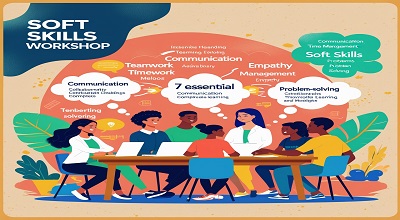Soft Skills Workshop
In today’s fast-paced professional world, possessing technical expertise is no longer enough to succeed. Employers and organizations increasingly value soft skills—interpersonal abilities that enhance communication, collaboration, and problem-solving. This is where soft skills workshops play, a powerful tool to equip individuals with these essential skills. This article explores the concept of a soft skills workshop, delves into the importance of soft skills, and outlines seven crucial soft skills to master. Additionally, we’ll answer seven frequently asked questions to provide a comprehensive understanding of the subject.
What is a Soft Skills Workshop?
A soft skills workshop is a structured training program designed to enhance interpersonal, communication, and professional abilities that facilitate effective interactions in both personal and workplace settings. These workshops often involve interactive sessions, role-playing activities, group discussions, and real-world scenarios to provide participants with hands-on experience.
Soft skills workshops aim to:
- Enhance Communication: Improve verbal and non-verbal communication skills.
- Build Emotional Intelligence: Foster self-awareness and empathy.
- Boost Team Collaboration: Strengthen teamwork and cooperation.
- Improve Problem-Solving Skills: Equip individuals with strategies to tackle challenges effectively.
- Develop Leadership Abilities: Teach participants how to motivate and guide others.
Why are Soft Skills Important?
Soft skills are the backbone of professional and personal success. They complement technical expertise and enable individuals to build relationships, lead teams, and adapt to changing environments. In the workplace, soft skills contribute to better productivity, stronger leadership, and improved morale.
Key Benefits of Soft Skills
- Enhanced Employability: Recruiters prioritize candidates who demonstrate strong interpersonal and communication abilities.
- Better Workplace Harmony: Soft skills promote understanding, reduce conflicts, and encourage teamwork.
- Increased Leadership Potential: Effective leaders rely on skills like communication, empathy, and problem-solving.
- Improved Career Growth: Individuals with refined soft skills are more likely to secure promotions and career advancements.
7 Essential Soft Skills to Master
1. Communication Skills
Communication is the cornerstone of soft skills. It encompasses verbal, non-verbal, and written communication, enabling individuals to convey ideas clearly and effectively.
Tips to Improve Communication Skills:
- Practice active listening.
- Use clear and concise language.
- Be mindful of body language and tone.
2. Emotional Intelligence (EI)
Emotional intelligence is understanding and managing one’s emotions while empathizing with others. It enhances interpersonal relationships and decision-making.
Components of Emotional Intelligence:
- Self-awareness
- Self-regulation
- Empathy
- Social skills
3. Teamwork and Collaboration
The ability to work effectively in a team is vital in most professional settings. Teamwork involves understanding group dynamics, contributing to collective goals, and resolving conflicts.
Ways to Enhance Teamwork Skills:
- Be open to feedback.
- Respect diverse perspectives.
- Share responsibilities equitably.
4. Problem-Solving Skills
Problem-solving involves analyzing challenges and identifying effective solutions. It requires critical thinking, creativity, and decision-making abilities.
Steps to Develop Problem-Solving Skills:
- Identify the root cause of the problem.
- Brainstorm potential solutions.
- Evaluate and implement the best option.
5. Adaptability
In an ever-changing professional environment, adaptability is crucial. It involves embracing change and learning new skills to stay relevant.
Strategies to Improve Adaptability:
- Maintain a positive attitude towards change.
- Be open to learning.
- Practice resilience in challenging situations.
6. Leadership Skills
Leadership is not limited to managerial roles. It involves inspiring and guiding others, setting an example, and making decisions that benefit the group.
Traits of Effective Leaders:
- Vision and strategic thinking
- Communication and motivation
- Accountability and empathy
7. Time Management
Time management enables individuals to prioritize tasks, meet deadlines, and maintain a healthy work-life balance. It improves productivity and reduces stress.
Techniques for Better Time Management:
- Use tools like to-do lists and calendars.
- Set realistic goals and deadlines.
- Avoid procrastination.
How to Conduct an Effective Soft Skills Workshop?
1. Identify Objectives
Define the skills you aim to develop and tailor the workshop to meet those goals.
2. Choose the Right Format
Incorporate activities like role-playing, case studies, and group discussions to ensure active participation.
3. Use Real-World Scenarios
Simulate workplace situations to help participants relate the skills to their daily lives.
4. Provide Feedback
Constructive feedback helps participants identify their strengths and areas for improvement.
5. Measure Outcomes
Use surveys and assessments to evaluate the effectiveness of the workshop.
FAQs About Soft Skills Workshops
1. What are soft skills workshops suitable for?
Soft skills workshops are ideal for students, professionals, managers, and anyone looking to enhance their interpersonal abilities and workplace effectiveness.
2. How long does a typical soft skills workshop last?
Workshops can range from a few hours to several days, depending on the skills being addressed and the depth of training required.
3. Are soft skills workshops beneficial for remote teams?
Yes, they are invaluable for remote teams, improving communication, collaboration, and adaptability in virtual environments.
4. Can soft skills be learned online?
Absolutely. Online courses, webinars, and virtual workshops provide flexible and effective ways to develop soft skills.
5. How can I measure the success of a soft skills workshop?
Success can be measured through participant feedback, pre-and post-training assessments, and observing behavioral changes over time.
6. Are soft skills workshops suitable for introverts?
Yes, workshops are designed to create a comfortable environment where introverts can practice and build their interpersonal abilities.
7. What industries benefit most from soft skills training?
Every industry benefits, but sectors like healthcare, customer service, education, and corporate management particularly rely on strong soft skills.
Conclusion
Soft skills workshops are invaluable tools for personal and professional development. By focusing on essential skills like communication, emotional intelligence, teamwork, and time management, these workshops empower individuals to succeed in any environment. Whether you’re an aspiring leader or a seasoned professional, investing in soft skills is a step toward a brighter, more collaborative future.
